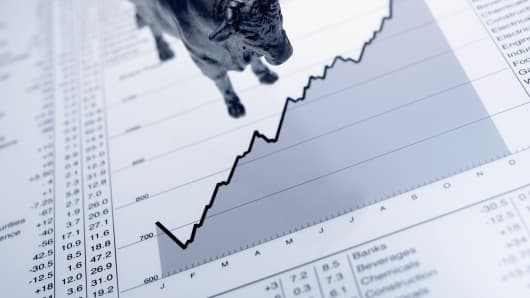The U.K.'s blue-chip index has soared 10 percent so far this year breaking through the psychological 6,500 point barrier, but there's more to come according to the world's largest investment bank.
Goldman Sachs say the FTSE could reach all-time highs of 7,200 despite stuttering growth and a plummeting pound in the U.K., but warns that this meteoric rise means little for international investors in the near term.
"We raise our FTSE 100 targets, to 6,600, 6,800 and 7,200 over three, six and twelve months respectively," the European research team at Goldman Sachs said in a note, adding that price return would be 10 percent over the next twelve months.
(Read More: Specter of Stagflation Haunts UK)
The FTSE 100 has risen sharply this year but only in sterling terms, according to Goldman Sachs. Taking the largest 20 markets globally and ranking them in dollar returns, the U.K. comes a below-average fifteenth, it said.
"It is strange that the FTSE 100 has done so poorly in dollar or euro terms given that most of the earnings are non-sterling. For the FTSE 100 45 percent of dividends are paid in dollars."
As the FTSE has posted serous gains, sterling has sunk. The currency is the worst performer in the international currency markets this year, tumbling 8.5 percent against the dollar and 7 percent against the euro.
(Read More: US Investors Should Fear Tumbling Pound: Citi)
This decline as well as a fall in real interest rates and credit spreads has proved favorable for the FTSE, according to Goldman. The bank also predicts further central bank easing down the road in the absence of strong inflationary pressures, although rather than quantitative easing it forecasts credit easing or "unconventional measures".
Despite this inconsistency with dollar earnings, Goldman tells its investors to stick with the FTSE 100 as well as the FTSE 250 as stocks will only tread higher.
(Read More: Pound Tumbles as UK Heads for Further QE)
"We would also prefer the U.K. market to Europe more broadly, partly because of the potential for further easing by the BoE (Bank of England), but also because of the U.K. stock market's exposure to global growth and the lack of performance so far this year."
Goldman said the impact of the move in sterling affecting dollar earnings for U.K. corporates will fade after five to six months and will turn the other way.
—By CNBC.com's Matt Clinch



